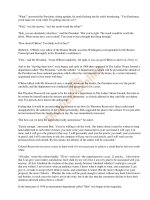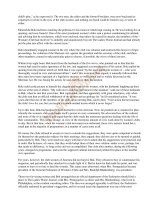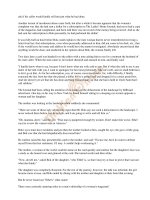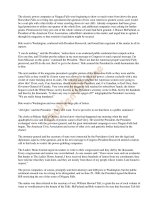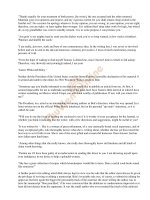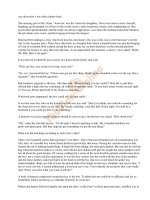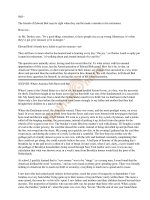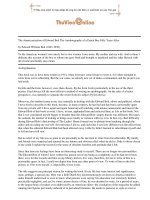The Americanization of Edward Bok 16
Bạn đang xem bản rút gọn của tài liệu. Xem và tải ngay bản đầy đủ của tài liệu tại đây (170.33 KB, 10 trang )
"Thanks equally for your treatment of both poems, [he wrote], the one accepted and the other returned.
Maintain your own opinions and respect, and my vigorous esteem for you shall remain 'deep-rooted in the
fruitful soil.' No occasion for apology whatever. In my opinion, you are wrong; in your opinion, you are right;
therefore, you are right,--at least righter than wronger. It is seldom that I drop other work for logic, but when I
do, as my grandfather was wont to sturdily remark, 'it is to some purpose, I can promise you.'
"Am goin' to try mighty hard to send you the dialect work you've so long wanted; in few weeks at furthest.
'Patience and shuffle the cards.'
"I am really, just now, stark and bare of one commonsence idea. In the writing line, I was never so involved
before and see no end to the ink-(an humorous voluntary provocative, I trust of much merriment)-creasing
pressure of it all.
"Even the hope of waking to find myself famous is denied me, since I haven't time in which to fall asleep.
Therefore, very drowsily and yawningly indeed, I am your
"James Whitcomb Riley."
Neither did the President of the United States consider himself above a possible declination of his material if
it seemed advisable to the editor. In 1916 Woodrow Wilson wrote to Bok:
"Sometime ago you kindly intimated to me that you would like to publish an article from me. At first, it
seemed impossible for me to undertake anything of the kind, but I have found a little interval in which I have
written something on Mexico which I hope you will think worthy of publication. If not, will you return it to
me?"
The President, too, acted as an intermediary in turning authors in Bok's direction, when the way opened. In a
letter written not on the official White House letterhead, but on his personal "up-stairs" stationery, as it is
called, he asks:
"Will you do me the favor of reading the enclosed to see if it is worthy of your acceptance for the Journal, or
whether you think it indicates that the writer, with a few directions and suggestions, might be useful to you?
"It was written by --. She is a woman of great refinement, of a very unusually broad social experience, and of
many exceptional gifts, who thoroughly knows what she is writing about, whether she has yet discovered the
best way to set it forth or not. She is one of the most gifted and resourceful hostesses I have known, but has
now fallen upon hard times.
"Among other things that she really knows, she really does thoroughly know old furniture and all kinds of
china worth knowing.
"Pardon me if I have been guilty of an indiscretion in sending this direct to you. I am throwing myself upon
your indulgence in my desire to help a splendid woman.
"She has a great collection of recipes which housekeepers would like to have. Does a serial cook-book sound
like nonsense?"
A further point in his editing which Bok always kept in view was his rule that the editor must always be given
the privilege of revising or editing a manuscript. Bok's invariable rule was, of course, to submit his editing for
approval, but here again the bigger the personality back of the material, the more willing the author was to
have his manuscript "blue pencilled," if he were convinced that the deletions or condensations improved or at
least did not detract from his arguments. It was the small author who ever resented the touch of the editorial
The Legal Small Print 156
pencil upon his precious effusions.
As a matter of fact there are few authors who cannot be edited with advantage, and it would be infinitely
better for our reading if this truth was applied to some of the literature of to-day.
Bok had once under his hand a story by Mark Twain, which he believed contained passages that should be
deleted. They represented a goodly portion of the manuscript. They were, however, taken out, and the result
submitted to the humorist. The answer was curious. Twain evidently saw that Bok was right, for he wrote: "Of
course, I want every single line and word of it left out," and then added: "Do me the favor to call the next time
you are again in Hartford. I want to say things which--well, I want to argue with you." Bok never knew what
those "things" were, for at the next meeting they were not referred to.
It is, perhaps, a curious coincidence that all the Presidents of the United States whose work Bok had occasion
to publish were uniformly liberal with regard to having their material edited.
Colonel Roosevelt was always ready to concede improvement: "Fine," he wrote; "the changes are much for
the better. I never object to my work being improved, where it needs it, so long as the sense is not altered."
William Howard Taft wrote, after being subjected to editorial revision: "You have done very well by my
article. You have made it much more readable by your rearrangement."
Mr. Cleveland was very likely to let his interest in a subject run counter to the space exigencies of journalism;
and Bok, in one instance, had to reduce one of his articles considerably. He explained the reason and enclosed
the revision.
"I am entirely willing to have the article cut down as you suggest," wrote the former President. "I find
sufficient reason for this in the fact that the matter you suggest for elimination has been largely exploited
lately. And in looking the matter over carefully, I am inclined to think that the article expurgated as you
suggest will gain in unity and directness. At first, I feared it would appear a little 'bobbed' off, but you are a
much better judge of that than I. ... I leave it altogether to you."
It was always interesting to Bok, as a study of mental processes, to note how differently he and some author
with whom he would talk it over would see the method of treating some theme. He was discussing the
growing unrest among American women with Rudyard Kipling at the latter's English home; and expressed the
desire that the novelist should treat the subject and its causes.
They talked until the early hours, when it was agreed that each should write out a plan, suggest the best
treatment, and come together the next morning. When they did so, Kipling had mapped out the scenario of a
novel; Bok had sketched out the headings of a series of analytical articles. Neither one could see the other's
viewpoint, Kipling contending for the greater power of fiction and Bok strongly arguing for the value of the
direct essay. In this instance, the point was never settled, for the work failed to materialize in any form!
If the readers of The Ladies' Home Journal were quick to support its editor when he presented an idea that
appealed to them, they were equally quick to tell him when he gave them something of which they did not
approve. An illustration of this occurred during the dance-craze that preceded the Great War. In 1914,
America was dance-mad, and the character of the dances rapidly grew more and more offensive. Bok's
readers, by the hundreds, urged him to come out against the tendency.
The editor looked around and found that the country's terpsichorean idols were Mr. and Mrs. Vernon Castle;
he decided that, with their cooperation, he might, by thus going to the fountainhead, effect an improvement
through the introduction, by the Castles, of better and more decorous new dances. Bok could see no reason
why the people should not dance, if they wanted to, so long as they kept within the bounds of decency.
The Legal Small Print 157
He found the Castles willing and eager to cooperate, not only because of the publicity it would mean for them,
but because they were themselves not in favor of the new mode. They had little sympathy for the elimination
of the graceful dance by the introduction of what they called the "shuffle" or the "bunny-hug," "turkey-trot,"
and other ungraceful and unworthy dances. It was decided that the Castles should, through Bok's magazine
and their own public exhibitions, revive the gavotte, the polka, and finally the waltz. They would evolve these
into new forms and Bok would present them pictorially. A series of three double-page presentations was
decided upon, allowing for large photographs so that the steps could be easily seen and learned from the
printed page.
The magazine containing the first "lesson" was no sooner published than protests began to come in by the
hundreds. Bok had not stated his object, and the public misconstrued his effort and purpose into an
acknowledgment that he had fallen a victim to the prevailing craze. He explained in letters, but to no purpose.
Try as he might, Bok could not rid the pages of the savor of the cabaret. He published the three dances as
agreed, but he realized he had made a mistake, and was as much disgusted as were his readers. Nor did he, in
the slightest degree, improve the dance situation. The public refused to try the new Castle dances, and kept on
turkey-trotting and bunny-hugging.
The Ladies' Home Journal followed the Castle lessons with a series of the most beautiful dances of Madam
Pavlowa, the Russian dancer, hoping to remove the unfavorable impression of the former series. But it was
only partially successful. Bok had made a mistake in recognizing the craze at all; he should have ignored it, as
he had so often in the past ignored other temporary, superficial hysterics of the public. The Journal readers
knew the magazine had made a mistake and frankly said so.
Which shows that, even after having been for over twenty-five years in the editorial chair, Edward Bok was
by no means infallible in his judgment of what the public wanted or would accept.
No man is, for that matter.
XXXIV. A War Magazine and War Activities
When, early in 1917, events began so to shape themselves as directly to point to the entrance of the United
States into the Great War, Edward Bok set himself to formulate a policy for The Ladies' Home Journal. He
knew that he was in an almost insurmountably difficult position. The huge edition necessitated going to press
fully six weeks in advance of publication, and the preparation of material fully four weeks previous to that. He
could not, therefore, get much closer than ten weeks to the date when his readers received the magazine. And
he knew that events, in war time, had a way of moving rapidly.
Late in January he went to Washington, consulted those authorities who could indicate possibilities to him
better than any one else, and found, as he had suspected, that the entry of the United States into the war was a
practical certainty; it was only a question of time.
Bok went South for a month's holiday to get ready for the fray, and in the saddle and on the golf links he
formulated a policy. The newspapers and weeklies would send innumerable correspondents to the front, and
obviously, with the necessity for going to press so far in advance, The Journal could not compete with them.
They would depict every activity in the field. There was but one logical thing for him to do: ignore the "front"
entirely, refuse all the offers of correspondents, men and women, who wanted to go with the armies for his
magazine, and cover fully and practically the results of the war as they would affect the women left behind.
He went carefully over the ground to see what these would be, along what particular lines women's activities
would be most likely to go, and then went home and back to Washington.
It was now March. He conferred with the President, had his fears confirmed, and offered all the resources of
his magazine to the government. His diagnosis of the situation was verified in every detail by the authorities
The Legal Small Print 158
whom he consulted. The Ladies' Home Journal could best serve by keeping up the morale at home and by
helping to meet the problems that would confront the women; as the President said: "Give help in the second
line of defense."
A year before, Bok had opened a separate editorial office in Washington and had secured Dudley Harmon, the
Washington correspondent for The New York Sun, as his editor-in-charge. The purpose was to bring the
women of the country into a clearer understanding of their government and a closer relation with it. This work
had been so successful as to necessitate a force of four offices and twenty stenographers. Bok now placed this
Washington office on a war-basis, bringing it into close relation with every department of the government that
would be connected with the war activities. By this means, he had an editor and an organized force on the
spot, devoting full time to the preparation of war material, with Mr. Harmon in daily conference with the
department chiefs to secure the newest developments.
Bok learned that the country's first act would be to recruit for the navy, so as to get this branch of the service
into a state of preparedness. He therefore secured Franklin D. Roosevelt, assistant secretary of the navy, to
write an article explaining to mothers why they should let their boys volunteer for the Navy and what it would
mean to them.
He made arrangements at the American Red Cross Headquarters for an official department to begin at once in
the magazine, telling women the first steps that would be taken by the Red Cross and how they could help. He
secured former President William Howard Taft, as chairman of the Central Committee of the Red Cross, for
the editor of this department.
He cabled to Viscount Northcliffe and Ian Hay for articles showing what the English women had done at the
outbreak of the war, the mistakes they had made, what errors the American women should avoid, the right
lines along which English women had worked and how their American sisters could adapt these methods to
transatlantic conditions.
And so it happened that when the first war issue of The Journal appeared on April 20th, only three weeks after
the President's declaration, it was the only monthly that recognized the existence of war, and its pages had
already begun to indicate practical lines along which women could help.
The President planned to bring the Y. M. C. A. into the service by making it a war-work body, and Bok
immediately made arrangements for a page to appear each month under the editorship of John R. Mott,
general secretary of the International Y. M. C. A. Committee.
The editor had been told that the question of food would come to be of paramount importance; he knew that
Herbert Hoover had been asked to return to America as soon as he could close his work abroad, and he cabled
over to his English representative to arrange that the proposed Food Administrator should know, at first hand,
of the magazine and its possibilities for the furtherance of the proposed Food Administration work.
The Food Administration was no sooner organized than Bok made arrangements for an authoritative
department to be conducted in his magazine, reflecting the plans and desires of the Food Administration, and
Herbert Hoover's first public declaration as food administrator to the women of America was published in The
Ladies' Home Journal. Bok now placed all the resources of his four-color press-work at Mr. Hoover's
disposal; and the Food Administration's domestic experts, in conjunction with the full culinary staff of the
magazine, prepared the new war dishes and presented them appetizingly in full colors under the personal
endorsement of Mr. Hoover and the Food Administration. From six to sixteen articles per month were now
coming from Mr. Hoover's department alone.
The Department of Agriculture was laid under contribution by the magazine for the best ideas for the raising
of food from the soil in the creation of war-gardens.
The Legal Small Print 159
Doctor Anna Howard Shaw had been appointed chairman of the National Committee of the Women's Council
of National Defence, and Bok arranged at once with her that she should edit a department page in his
magazine, setting forth the plans of the committee and how the women of America could co-operate
therewith.
The magazine had thus practically become the semiofficial mouthpiece of all the various government war
bureaus and war-work bodies. James A. Flaherty, supreme knight of the Knights of Columbus, explained the
proposed work of that body; Commander Evangeline Booth presented the plans of the Salvation Army, and
Mrs. Robert E. Speer, president of the National Board of the Young Women's Christian Association, reflected
the activities of her organization; while the President's daughter, Miss Margaret Wilson, discussed her work
for the opening of all schoolhouses as community war-centres.
The magazine reflected in full-color pictures the life and activities of the boys in the American camps, and
William C. Gorgas, surgeon-general of the United States, was the spokesman in the magazine for the health of
the boys.
Secretary of the Treasury McAdoo interpreted the first Liberty Loan "drive" to the women; the President of
the United States, in a special message to women, wrote in behalf of the subsequent Loan; Bernard Baruch, as
chairman of the War Industries Board, made clear the need for war-time thrift; the recalled ambassador to
Germany, James W. Gerard, told of the ingenious plans resorted to by German women which American
women could profitably copy; and Elizabeth, Queen of the Belgians, explained the plight of the babies and
children of Belgium, and made a plea to the women of the magazine to help. So straight to the point did the
Queen write, and so well did she present her case that within six months there had been sent to her, through
The Ladies' Home Journal, two hundred and forty-eight thousand cans of condensed milk, seventy-two
thousand cans of pork and beans, five thousand cans of infants' prepared food, eighty thousand cans of beef
soup, and nearly four thousand bushels of wheat, purchased with the money donated by the magazine readers.
On the coming of the coal question, the magazine immediately reflected the findings and recommendations of
the Fuel Administration, and Doctor H. A. Garfield, as fuel administrator, placed the material of his Bureau at
the disposal of the magazine's Washington editor.
The Committee on Public Information now sought the magazine for the issuance of a series of official
announcements explanatory of matters to women.
When the "meatless" and the "wheatless" days were inaugurated, the women of America found that the
magazine had anticipated their coming; and the issue appearing on the first of these days, as publicly
announced by the Food Administration, presented pages of substitutes in full colors.
Of course, miscellaneous articles on the war there were, without number. Before the war was ended, the
magazine did send a representative to the front in Catherine Van Dyke, who did most effective work for the
magazine in articles of a general nature. The fullpage battle pictures, painted from data furnished by those
who took actual part, were universally commended and exhausted even the largest editions that could be
printed. A source of continual astonishment was the number of copies of the magazine found among the boys
in France; it became the third in the official War Department list of the most desired American periodicals,
evidently representing a tie between the boys and their home folks. But all these "war" features, while
appreciated and desirable, were, after all, but a side-issue to the more practical economic work of the
magazine. It was in this service that the magazine excelled, it was for this reason that the women at home so
eagerly bought it, and that it was impossible to supply each month the editions called for by the extraordinary
demand.
Considering the difficulties to be surmounted, due to the advance preparation of material, and considering
that, at the best, most of its advance information, even by the highest authorities, could only be in the nature
The Legal Small Print 160
